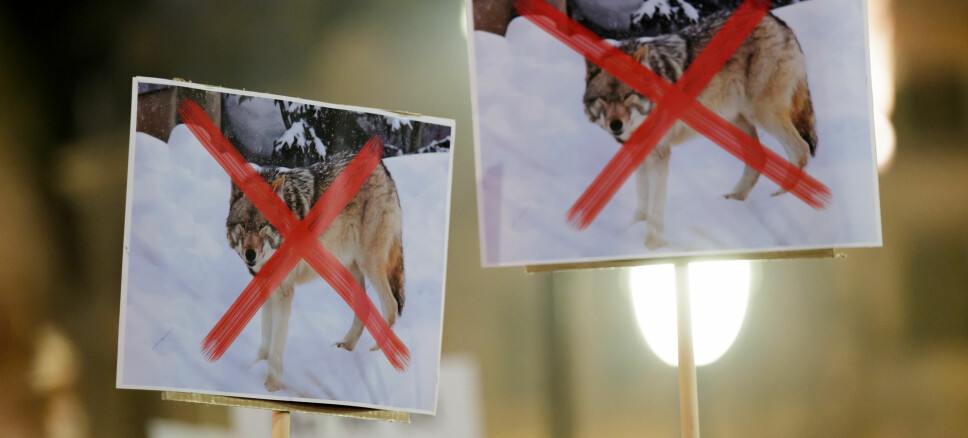
What kind of person supports illegal hunting of Norway’s wolves?
If you think it’s okay to shoot wolves illegally, you are probably also opposed to immigration and a climate sceptic. Living in proximity to where wolves are found in Norway however, has little influence on your opinion, researchers say.
Eight per cent of Norwegians recently surveyed fully support the illegal hunting of wolves, according to a recent opinion poll of roughly 3,000 Norwegians.
This attitude represents something more than — and other than — just wolves. That’s what researchers at the Norwegian Institute for Natural Research (NINA) learned when they previously talked to wolf opponents.
The tendency was evident in a 2016-17 representative survey of the Norwegian population.
Opposition to wolves, immigration and climate science were opinions that were linked.
People who defended the idea of shooting wolves without a permit were more likely to agree with statements such as "we have enough immigrants" and "global warming is a myth". They were also less concerned with nature's intrinsic value.
Most people believe illegal killing is unacceptable
But of course, there are people who oppose immigration and are sceptical about global warming but who don’t defend illegal hunting, and people who support illegal hunting but are not climate sceptics or opposed to immigration.
The support for illegal killing is also linked to distrust of the ruling elite, the researchers found. Supporters of illegal hunting are more likely to answer yes to statements such as "experts decide too much", and "common sense is better than education".
Confidence in the Ministry of Climate and Environment is lower in this group. The Ministry is the overarching governing power in managing Norway’s predator population.
These attitudes represent disagreements over how humans use nature, but they also represent the attitudes of people who are more generally resistant to big city power, the researchers believe.
This may be part of a larger trend in Europe, where right-wing populism is on the rise, the researchers suggest. In this way, illegal wolf hunting becomes a protest against social development and a type of political resistance.
However, most people find it unacceptable to shoot wolves without a permit.
Participants responded on a scale of one to five as to how much they agreed with the statement that it is acceptable to shoot wolves illegally.
Two out of three said they found this unacceptable, of which half responded that it is totally unacceptable.
In comparison, 16 per cent said they thought it is acceptable, of which 8 per cent said it is perfectly acceptable. Thirteen per cent were in the middle and 4 per cent didn’t quite know what they thought.
Controversy over Norway’s wolf population
Norway’s wolf population is highly controversial, with strong opinions regarding how many wolves should be allowed to live in the country and where they should be allowed to live.
The survey was conducted a couple of years after the arrests of twelve hunters in Hedmark County, on the Swedish border, who were charged with illegally hunting wolves. Five were sentenced to prison.
The issue received a lot of media coverage, and in some interviews, opposition to the Norwegian wolf population was linked to hunting and hunters.
But the regular hunter is as likely to believe it is wrong to kill wolves without a permit as non-hunting peers, the survey found. Also among hunters, opposition to wolves is linked to other political attitudes.
However, when researchers specifically surveyed 852 hunters, they found that some hunters thought shooting wolves illegally was not all that serious. More respondents had this opinion relative to other hunting-related offenses, according to the 2019 report upon which the new study is based. This may be because the wolf can cause problems for hunters, the researchers believe.
Little education, lives in the countryside
People with little education more often support illegal wolf hunting. Support increases with the respondent’s age. Wolves are also less popular in sparsely populated areas than in cities. At the same time, people in small towns and villages have less education than average.
Gender and income appear to be immaterial. And your attitude towards illegal hunting of wolves also doesn't seem to be affected by whether or not you live in an area with wolves.
One of the reasons for this may be that the country’s politically defined "wolf zone" — where wolves are given priority over sheep farming — also includes Oslo, which has wolves in Østmarka. People who live in this area, on the forest’s edge, are very supportive of wolves.
Most people like wolves, even those who claim to have wolves where they live. However, wolves are more popular in areas where there are no wolves in the wild. That’s what researchers found when they surveyed 2,200 Norwegians in 2018 on behalf of the Norwegian Environment Agency.
Only 37 per cent said they would like to have wolves in their own neighbourhood, according to a 2018 report from NINA. Fifty-seven per cent, on the other hand, said they thought it was okay that there are wolves in Norway, while 24 per cent said they didn’t like having wolves in the country. The remainder were neutral.
More wolves in Scandinavia
Interviews that the researchers conducted in the past indicate that it’s not just any wolf that wolf opponents want killed. They only want to get rid of wolves that they feel live nearby. Animals that are reclusive and don’t interact with humans can be left alone.
Wolves are legally shot in Norway, within a given quota. This leaves a number of wolves, although at numbers low enough that they are listed on the Norwegian Red List as critically endangered.
After several years of decline, the population in Scandinavia is at about the same level as in 2014, with around 450 wolves.
This winter, between 103 and 106 wolves were recorded in Norway, figures from Rovdata show. Rovdata is responsible for operating, communicating and developing the Norwegian Large Predator Monitoring Programme. Fifty-six of the animals lived in Norway, while 47 to 50 were located on both sides of the border with Sweden.
Translated by: Nancy Bazilchuk
Reference:
Olve Krange og Ketil Skogen: Loven øst for Glomma. Om støtte for ulovlig jakt på ulv som uttrykk for politisk motstand. (The law east of Glomma. Support for illegal killing of wolves as an expression of political resistance.) Norsk sosiologisk tidsskrift, 4, no. 3, 2020.
———
Read the Norwegian version of this story on forskning.no
































